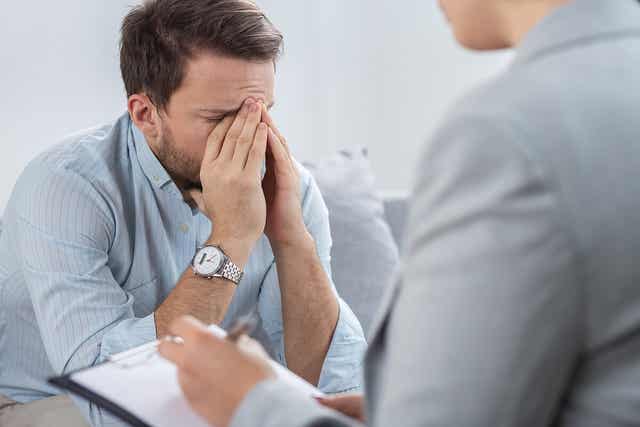Your Anxiety Habits: How to Break the Cycle


Written and verified by the psychologist Maria Fatima Seppi Vinuales
Most people experience certain levels of anxiety in their day-to-day lives, so your anxiety habits might be normal. After all, it makes sense that we’re constantly thinking about the future.
Specialists describe anxiety as a defensive and preparatory response. That’s because it allows you to look ahead and rehearse scenarios.
However, when your anxiety causes constant worrying or other problems in your life, it may be overwhelming. Regardless of your situation, it’s important to know some exercises that can help you manage your anxiety habits.
Keep reading to learn more!
Habits that can trigger your anxiety
Sometimes, it’s difficult to realize which habits trigger your anxiety. We tend to analyze what we’re feeling instead of what led us to feel that way.
So, what habits can cause anxiety?
There are a lot.
Today, we’ll share some of the most common ones.
Unhealthy behaviors
Anxiety has a physiological component. Therefore, taking care of your physical health can help decrease your anxiety.
In addition, it’s best to:
- Get enough sleep.
- Maintain a healthy diet.
- Avoid stimulants like caffeine, alcohol, and psychotropic medications.
- Walk for at least 15 minutes a day.
- Do any other form of physical exercise.
Justifying your concerns
One of the reasons people develop anxiety habits is that they believe their concerns are justified. For example, people with anxiety are “caught” in an anxious loop because they think worrying about this issue will help them avoid it or control the situation.
In addition, they think that by visualizing future scenarios, they’ll be better prepared to face them. Also, they try to justify their concern by saying it motivates them. They believe that worrying about the future will motivate them to do the right thing.
However, these are all habits that can trigger your anxiety. Instead of helping, they end up causing the person constant stress.
Taking on too many responsibilities
One of your anxiety habits may including planning for the day as if there were more than 24 hours to get everything done. You have to remember that your body cannot do that many things in such a short period of time. Each day has a set number of hours and your body will start to feel stressed out.
Saying yes to everything, going to every social gathering you’re invited to, signing up for as many courses as you can, and doing all of your housework is all too much. No person could do all of those things without feeling overwhelmed.
Therefore, it makes sense that our stress and anxiety levels increase when we’re faced with a jam-packed day where there isn’t even enough time to take a break. It’s important to set limits and give your body time to rest.
Your anxiety habits could make you uncomfortable
Just like taking on too many commitments, procrastinating until the last minute can also cause anxiety. Here are some other anxiety habits that are detrimental to your well-being:
- Smoking and drinking alcohol
- Skipping meals
- Staying inside all-day
- Constantly checking your phone

Keep reading: How to Help Someone with Generalized Anxiety Disorder
Your anxiety habits: How to break the cycle
One of the worst parts of anxiety is that it causes more anxiety.
At first, you might just be worried about a situation (like doing poorly on a test). However, later it could grow to a point where you’re worried about being worried (meta-worry) or you’re anxious about feeling anxious (meta-anxiety). That will only increase your stress and tension.
We see this when people say things like, “my thoughts are going to make me sick.” That’s why it’s so important to break the cycle of your anxiety habits. Here are some strategies you can use:
Question your thinking and try to change it
Justifying your concerns won’t help your anxiety. Instead, it will anchor you to it. So, one of the first things you should do is learn to “map your anxiety.”
What is causing it? How do you feel? You have to learn more about your anxiety to notice it in time to prevent it. In other words, question your reasons for worrying and remind yourself that it’s not helping the situation.
Form new anxiety habits
This strategy goes hand-in-hand with the previous one. It’s important to develop new habits that are friendlier and more respectful to your well-being. This will be a challenge, especially for those that tend to make excuses, but you need to push yourself.
Can’t exercise every day? Take the stairs instead of the elevator, or get off one bus stop early and walk a few blocks to get to work. Remember, there’s always a way to feel better, you just have to know how to look for it.
Practice mindfulness and relaxation
One of the techniques that are currently very popular among people trying to change their anxiety habits is mindfulness and relaxation. It’s based on focusing on the “here and now,” so you can interrupt your anxious, future-oriented thoughts. In addition, relaxation provides resources that will help you control your breathing and learn to calm down.
Also read: 4 Tips to Help a Child Who Suffers from Social Anxiety
When to seek professional help about your anxiety habits
Remember, moderate anxiety helps us function and adapt to our changing environments. It gets our brains moving healthily so we can solve the problems we’re faced with.
However, when it gets to a certain point, anxiety can cause discomfort. When we have to deal with that discomfort for long periods of time, the anxiety is dysfunctional and unhealthy. If your anxiety gets to that point, you should consult a professional.
Some people experience sudden panic attacks with intense peaks of anxiety in a very short period of time. They tend to not last very long. However, for the person experiencing it, the attack can feel like it’s lasting forever. They may feel like they’re dying or are in imminent danger.
In many cases, these attacks reinforce the anxiety because the person will start to worry that they’ll have another episode. That can lead to isolation and avoidance of social situations. A professional will determine which strategies you should use to control that worry. Here are some of the most common:
- Psychoeducation
- Relaxation
- Cognitive-behavioral therapy teaches patients to question their thoughts
- Prescription medications

Conclusion
Think of anxiety as a fire alarm that goes off when you’re dealing with certain stimuli. When fire alarms go off, we know what steps to take to keep ourselves safe. However, if that alarm is going off all the time, it can affect our rest, concentration, and our general well-being. Therefore, we can’t have it going off all the time.
So, just as we would do to silence the alarm, we need to take action when we’re dealing with excessive anxiety. Even though life always has us on the move, you shouldn’t normalize certain levels of anxiety that threaten your well-being. That’s especially true when you keep in mind that it can cause other health problems.
All cited sources were thoroughly reviewed by our team to ensure their quality, reliability, currency, and validity. The bibliography of this article was considered reliable and of academic or scientific accuracy.
- Yannakoulia M, Panagiotakos DB, Pitsavos C, Tsetsekou E, Fappa E, Papageorgiou C, Stefanadis C. Eating habits in relations to anxiety symptoms among apparently healthy adults. A pattern analysis from the ATTICA Study. Appetite. 2008 Nov;51(3):519-25. doi: 10.1016/j.appet.2008.04.002. Epub 2008 Apr 8. PMID: 18495296.
- Chand SP, Marwaha R. Anxiety. [Updated 2021 May 1]. In: StatPearls [Internet]. Treasure Island (FL): StatPearls Publishing; 2021 Jan-. Available from: https://www.ncbi.nlm.nih.gov/books/NBK470361/
- Blanco, M. G., Imaz, J. A., de la Fuente Robles, Y. M., Laso, M. G., & Calvete, B. G. (2007). La ansiedad en el personal sanitario. Enfermería en cardiología: revista científica e informativa de la Asociación Española de Enfermería en Cardiología, (42), 41-45.
This text is provided for informational purposes only and does not replace consultation with a professional. If in doubt, consult your specialist.








